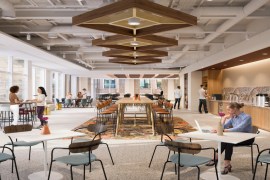The Building Owners and Managers Association (BOMA) — in collaboration with property management software company Yardi and Brightline Strategies, a research advisory service provider — released a comprehensive study comprised of responses from more than 1,270 office decision-makers. The survey focused on the effects of the pandemic on tenants’ sentiments toward their office space and the future of commercial real estate and it was designed to help uncover any upcoming financial and operational implications of this sector for both real estate owners and operators.
Importantly, changes brought about during the pandemic years drove a new way of working and increased flexibility in terms of both space and time. As such, tenants are now facing new challenges when it comes to updated working models. Accordingly, the reinvention of the traditional office space is necessary in order to harbor and retain talent — and tenants, as well as managers, need to adapt to the ever-changing work environment.
Keep reading for highlights from the recent report:
Back to the Office & What That Means for Occupancy Rates
When asked about returning to the office, 78% of respondents said they were perfectly comfortable doing so. That’s an improvement on previous surveys, thereby showing a decrease in health concerns and better alignment with COVID-19 safety measures. However, the possibility (60%) of a challenge regarding the reacquaintance of employees to the in-office environment — along with the significant associated costs — were partly holding back the otherwise increasing enthusiasm on the matter of returning to the office. That said, the survey also revealed that smaller businesses tended to be less supportive of remote work than larger ones.
Telework & Hybrid Schedules — Already a Thing of the Past?
After more than two years of working remotely, managers and employees were expected to have contradicting opinions regarding the work-from-home concept. However, the survey actually showed only minor gaps between sentiments from the two camps: 61% of managers supported at least three or four days a week in the office, while 60% of general employees shared that opinion. Meanwhile, only 16% of employees supported 100% remote work. And, notably, 10% of them said they would prefer a company-provided office space closer to their homes — signaling an increased interest in hybrid arrangements, including the coworking segment. As a whole, the office space is still believed to be an integral part of a company’s success. In fact, a striking 86% of tenants nationwide believed so — a percentage that grew by 8% since the 2021 survey.
Lease Renewal Intentions & Resizing Plans
Given the positive views on the importance of the office space, it may come as no surprise that 72% of tenants said they were planning to renew their leases. In all likelihood, this contributed to the return to pre-pandemic levels in terms of renewal intensity, as registered in the summer of 2022. However, staying on the more cautious side, 54% of respondents preferred a shorter lease term — with ranges from only three to five years, as opposed to the regular, seven- to 10-year leases.
At the same time, a whopping 70% of respondents said they would reassess their office space needs, showing a clear awareness regarding the flexible new work models. Conversely, only 17% were still feeling unsure in this matter. Notably, the likelihood of reassessing office space sizes rose significantly in major tech hotspots like California, Texas and the Northeast.
What’s Changed & What’s New in the Post-Pandemic Office
So, what does it take to bring people back to the office and what needs to be different? Well, it appears that nearly eight in 10 tenants (78%) preferred “beyond the status quo of typical amenities,” as opposed to only 64% in 2021. At the same time, 76% of property owners supported the continuous availability of hand sanitizer and 73% wanted the integration of more fresh air in HVAC systems. Similarly, in terms of technology that supports health and safety efforts, 65% of respondents quoted touchless elevators as a well-received integration.
Socialization & Face-to-Face Interaction
The value of office space was further demonstrated by the need for social interaction. Specifically, 73% of respondents said they valued the social component of the office environment and 75% reported that being in a physical workplace helped support innovation. Paired with the proper technology needed to work together with their peers, this was deemed to be fairly to very important.
While views surrounding the return to the traditional office are increasing in positivity, tenants — as well as employees — are still held back by rising economic concerns, higher costs and/or lengthy commutes.
However, coworking spaces could be a solution to these issues and more, as they enable higher flexibility and lower costs. Plus, the continuous rise in the popularity of flexible workspaces around the nation is a clear sign of the inevitable shift in preferences concerning the office footprint. At the same time, it’s predicted that more businesses — both large and small — will migrate toward coworking spaces in the future in an effort to be more cost-effective and provide employees with a more complex and flexible solution to their unique needs.
Check out the location below to find an ideal coworking space near your area:







